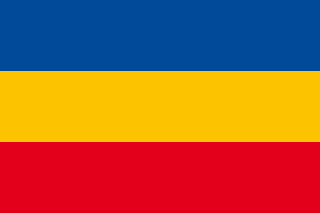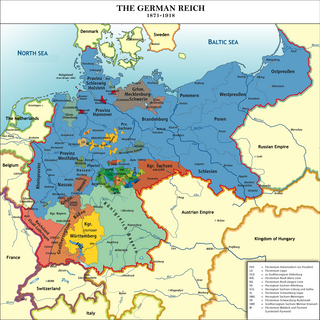See also
| This disambiguation page lists articles associated with the title Mecklenburg. If an internal link led you here, you may wish to change the link to point directly to the intended article. |
The name Mecklenburg (English formerly spelled Mecklenburgh) derives from a castle in northern Germany named "Mikilenburg" (Old German: "big castle"), located between the cities of Schwerin and Wismar. Mecklenburg may refer to:
| This disambiguation page lists articles associated with the title Mecklenburg. If an internal link led you here, you may wish to change the link to point directly to the intended article. |

Mecklenburg is a historical region in northern Germany comprising the western and larger part of the federal-state Mecklenburg-Vorpommern. The largest cities of the region are Rostock, Schwerin, Neubrandenburg, Wismar and Güstrow.

Mecklenburg-Vorpommern, also known by its anglicized name Mecklenburg-Western Pomerania or Mecklenburg-West Pomerania, is a state of Germany. Of the country's sixteen states, Mecklenburg-Vorpommern ranks 14th in population, 6th in area, and 16th in population density. Schwerin is the state capital and Rostock is the largest city. Other major cities include Neubrandenburg, Stralsund, Greifswald, Wismar and Güstrow.

The Duchy of Mecklenburg-Strelitz was a duchy in northern Germany, consisting of the eastern fifth of the historic Mecklenburg region, roughly corresponding with the present-day Mecklenburg-Strelitz district, and the western exclave of the former bishopric of Ratzeburg in modern Schleswig-Holstein. At the time of its establishment, the duchy bordered on the territory of Swedish Pomerania in the north and of Brandenburg in the south.

Neustrelitz is a town in the Mecklenburgische Seenplatte district in the state of Mecklenburg-Vorpommern, Germany. It is situated on the shore of the Zierker See in the Mecklenburg Lake District. From 1738 until 1918 it was the capital of the duchy of Mecklenburg-Strelitz. From 1994 until 2011 it was the capital of the district of Mecklenburg-Strelitz.

The Duchy of Mecklenburg-Schwerin was a duchy in northern Germany created in 1701, when Frederick William and Adolphus Frederick II divided the Duchy of Mecklenburg between Schwerin and Strelitz. Ruled by the successors of the Nikloting House of Mecklenburg, Mecklenburg-Schwerin remained a state of the Holy Roman Empire along the Baltic Sea littoral between Holstein-Glückstadt and Duchy of Pomerania.
The Evangelical Lutheran Church of Mecklenburg was a Lutheran church in the German state of Mecklenburg-Vorpommern, serving the citizens living in Mecklenburg. The seat of the Landesbischof was the state capital Schwerin, with Schwerin Cathedral as the principal church. It is the most important Protestant denomination in this area.

The House of Mecklenburg, also known as Nikloting, is a North German dynasty that ruled until 1918 in the Mecklenburg region, being among the longest-ruling families of Europe. Queen Juliana of the Netherlands (1909-2004), former Queen of the Netherlands (1948-1980), was an agnatic member of this house.
Strelitz refers to:

The Grand Duchy of Mecklenburg-Schwerin was a territory in Northern Germany held by the House of Mecklenburg residing at Schwerin. It was a sovereign member state of the German Confederation and became a federated state of the North German Confederation and finally of the German Empire in 1871.

The Grand Duchy of Mecklenburg-Strelitz was a territory in Northern Germany, held by the younger line of the House of Mecklenburg residing in Neustrelitz. Like the neighbouring Grand Duchy of Mecklenburg-Schwerin, it was a sovereign member state of the German Confederation and became a federated state of the North German Confederation and finally of the German Empire upon the unification of 1871. After World War I and the German Revolution of 1918–19 it was succeeded by the Free State of Mecklenburg-Strelitz.

Adolphus Frederick VI was the last reigning grand duke of Mecklenburg-Strelitz.

The Free State of Mecklenburg-Strelitz was a state of the Weimar Republic established in 1918 following the German Revolution which had overthrown the Grand Duchy of Mecklenburg-Strelitz. The state lasted until the Nazi Party (NSDAP) came to power in Germany and merged the state with the neighbouring Free State of Mecklenburg-Schwerin to form a new united state of Mecklenburg on December 31, 1933.

The Free State of Mecklenburg-Schwerin was a state in the Weimar Republic that was established in 1918 following the abdication of the Grand Duke of Mecklenburg-Schwerin following the German Revolution. In 1933, after the onset of Nazi rule, it was united with the smaller neighbouring state of Mecklenburg-Strelitz to form the united state of Mecklenburg on December 31, 1933.

Borwin, Duke of Mecklenburg has been the head of the House of Mecklenburg-Strelitz since 1996 and of the entire House of Mecklenburg since 2001. The death of Friedrich Franz, Hereditary Grand Duke of Mecklenburg-Schwerin - his god father - the last male member of the House of Mecklenburg-Schwerin on 31 July 2001 made Strelitz the only remaining line of the House of Mecklenburg, which ruled in Mecklenburg until 1918.

By the Hamburg Agreement on March 8, 1701, Mecklenburg was separated into two duchies with limited autonomy, which formed a collective state–as of 1815, the Grand Duchies of Mecklenburg-Schwerin and Mecklenburg-Strelitz. Since 1755, they had the same constitution and were under the control of the same parliament. In 1815, both parts became Grand Duchies by the Congress of Vienna.

The Mecklenburger is a warmblood horse bred in the Mecklenburg-Vorpommern region of north-eastern Germany. The breeding of these horses has been closely linked to the State Stud of Redefin.

The Grand Duchy of Mecklenburg Friedrich-Franz Railway was the state railway company in Mecklenburg-Schwerin and Mecklenburg-Strelitz. After its second nationalisation in 1890 up to the merger of the Länderbahnen into the Deutsche Reichsbahn in 1920 it was under the direction of the Grand Duchy's Executive Railway Board in Schwerin.

The Northern German football championship, operated by the Northern German Football Association (German: Norddeutscher Fußball-Verband , was the highest association football competition in Northern Germany, in the Prussian provinces of Schleswig-Holstein and Hanover and the German states of Hamburg, Lübeck, Mecklenburg-Schwerin, Mecklenburg-Strelitz, Oldenburg, Bremen and the Duchy of Brunswick. The regional associations, including the NFV, were dissolved in 1933 and the competition was not held again until 1946.